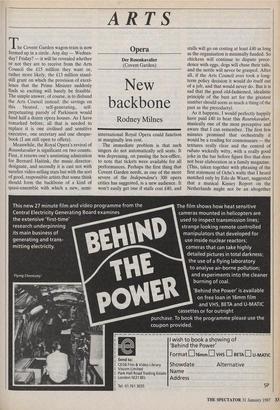ARTS
Opera
New backbone
Rodney Milnes
The Covent Garden wagon-train is now formed up in a circle. Any day — Wednes- day? Friday? — it will be revealed whether or not they are to receive from the Arts Council the £15 million they want or, rather more likely, the £13 million stand- still grant on which the provision of excel- lence that the Prime Minister suddenly finds so exciting will barely be feasible. The simple answer, of course, is to disband the Arts Council instead: the savings on this bloated, self-generating, self- perpetuating parody of Parkinson would fund half a dozen opera houses. As I have remarked before, all that is needed to replace it is one civilised and sensitive executive, one secretary and one cheque- book (I am still open to offers).
Meanwhile, the Royal Opera's revival of Rosenkavalier is significant on two counts. First, it renews one's unstinting admiration for Bernard Haitink, the music director- designate, and secondly it is cast not with surefire video-selling stars but with the sort of good, responsible artists that some think should form the backbone of a kind of quasi-ensemble with which a new, semi- international Royal Opera could function at marginally less cost.
The immediate problem is that such singers do not automatically sell seats. It was depressing, on passing the box-office, to note that tickets were available for all performances. Perhaps the first thing that Covent Garden needs, as one of the more severe of the Independent's 300 opera critics has suggested, is a new audience. It won't easily get one if stalls cost £40, and
stalls will go on costing at least £40 as long as the organisation is minimally funded. So chickens will continue to dispute prece- dence with eggs, dogs will chase their tails, and the nettle will never be grasped. After all, if the Arts Council ever took a long- term policy decision it would do itself out of a job, and that would never do. But it is sad that the good old-fashioned, idealistic principle of the best art for the greatest number should seem as much a thing of the past as the pterodactyl.
As it happens, I would perfectly happily have paid £40 to hear this Rosenkavalier, musically one of the most perceptive and aware that I can remember. The first few minutes promised that orchestrally it would be a reading for connoisseurs — the textures really clear and the control of rubato wickedly witty, with a really good joke in the bar before figure five that does not bear elaboration in a family magazine. (This, taken together with phrasing of the first statement of Ochs's waltz that I heard matched only by Edo de Waart, suggested that a musical Kinsey Report on the Netherlands might not be an altogether




































 Previous page
Previous page